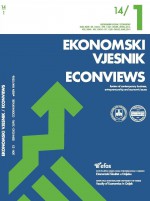Analysis of consumption behaviour concerning current income and lags consumption: Empirical evidence from Pakistan
Analysis of consumption behaviour concerning current income and lags consumption: Empirical evidence from Pakistan
Author(s): Abdul Qayyum Khan, Muhammad Azam, Muhammad Ejaz QureshiSubject(s): National Economy, Human Resources in Economy
Published by: Sveučilište Josipa Jurja Strossmayera u Osijeku, Ekonomski fakultet u Osijeku
Keywords: income; consumption; linear regression model;
Summary/Abstract: As in other economies, consumption expenditure is the largest component of the Gross Domestic Product (GDP) of Pakistan economy. The figure has been estimated around 80 percent of the GDP and demonstrates that historically, Pakistan’s economic growth is characterized as consumption-led growth. The present paper aims to explore the relationship between income and consumption using annual time series data for the period: 1975 to 2012 in Pakistan. For empirical investigation the linear regression model and the method of Least Squares is used as analytical techniques. Empirical results support the existence of a significant positive relationship between income and consumption. The finding suggests that long term committed planning is indispensable to enhance the productive capacity of the economy, employment opportunities and reduce poverty levels more effectively.
- Issue Year: 27/2014
- Issue No: 1
- Page Range: 59-70
- Page Count: 12
- Language: English

